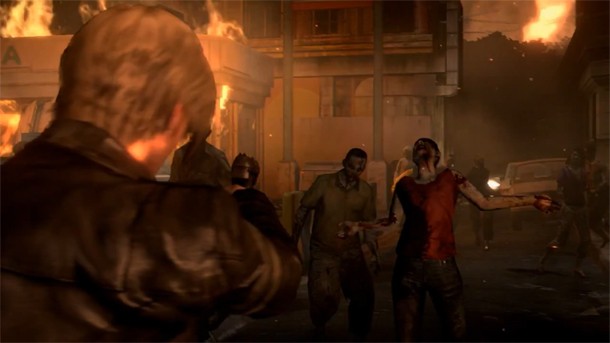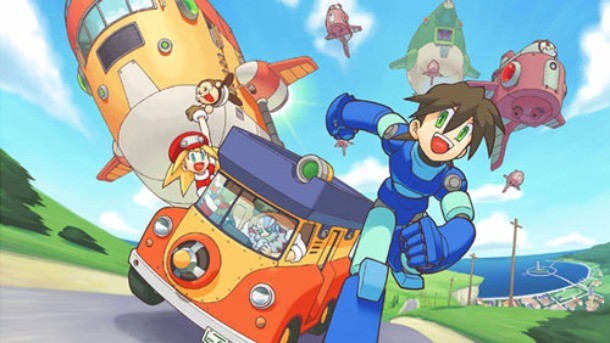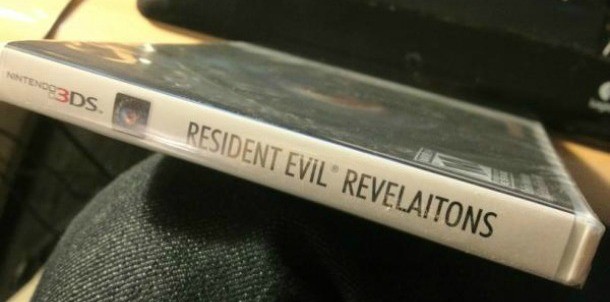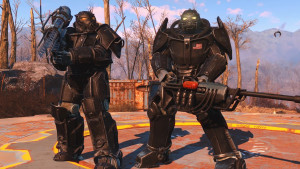Please support Game Informer. Print magazine subscriptions are less than $2 per issue
Capcom Going Big With Resident Evil

2012 is quickly becoming one of Capcom's busiest years to date.
The company started off by announcing Resident Evil 6 for this November and followed up with releases of Resident Evil: Revelations, Asura's Wrath, and Street Fighter X Tekken. In the coming months, fans can expect to see Resident Evil: Operation Raccoon City, Dragon's Dogma, Devil May Cry, and Steel Battalion: Heavy Armor.
During the Game Developers Conference in San Francisco last week, we discussed a variety of topics with Capcom's SVP of planning and business development Christian Svensson, including the company's expectations for Resident Evil 6, what the new iPad means for console gaming, and why they keep having all those typos.
------------------------------------------------------
Game Informer: Can you talk about the decision behind the timing of the announcement of Resident Evil 6? It seemed like it took attention away from Revelations and Operation Raccoon City, both due out a few months later.
Christian Svensson: That would be the conventional wisdom. However, we don’t think conventionally. We thought it would actually raise the awareness of all things Resident Evil, and as it turns out it did. Our preorders for Revelations and Raccoon City were both helped on an upward spike with the announcement of Resident Evil 6. The pre-orders for Resident Evil 6 are off to a fantastic start. The best start a Resident Evil game has ever had.
Why announce the November 20 release date so far out? The holiday season is already getting pretty crowded with other games.
We’re saying, "Get the hell out of the way." We’re a big game. We’re letting you know we’re coming. We’re giving people plenty of room to move around us. The other part is the nuts and bolts of it. If we put our stake in the ground, we can start lining up retail channel promotions, etc.
The trailer for Resident Evil 6 caters to both the original Resident Evil fans and newer fans. SEGA is currently dealing with a similar issue with Sonic having a split fan base and trying to cater to both. What’s it like having your biggest franchise at Capcom being split up like that?
I think Revelations did a good job of appealing to both audiences. There are classic elements in that game. I don’t think it’s at all an impossibility. I won’t get into the details too much about what the Resident Evil 6 team’s intentions were because we’ll talk about that more at Captivate. I think they’ll say the same thing, and that is part of the fun is figuring out how to scratch the itch of both audiences.
In terms of sales expectations for Resident Evil 6, you’re probably expecting it to be your biggest game to date in the series and it’ll have a massive marketing budget?
The plan is the biggest Resident Evil game ever. We’re not messing around.
A Resident Evil 6 demo is included with Dragon’s Dogma. The perception is that this move is an attempt to create more buzz for Dragon’s Dogma than anything else.
We have a few months to fix the buzz for that title. Obviously the inclusion of the demo raises the profile of the game. Hopefully we can find some new fans, transfer some love from Resident Evil 6 to Dragon’s Dogma. It’s a strategy that’s worked for several other games in the past. We think it’s going to be successful here, too. Ideally, Dragon’s Dogma becomes an ongoing, living thing for us.
The sales of Asura’s Wrath were 36,000 in the U.S. for the launch month. How would you evaluate that?
Kind of as predicted, frankly. It went about almost exactly how we thought it would. We also knew it was going to be pretty polarizing. The concept of playing a high-octane Japanese anime -- it found a specific audience, which we figured it would do.
Capcom recently announced the Onimusha mobile game. I think most fans are disappointed that Onimusha came back as a mobile game.
Right now our mobile roadmaps and our console roadmaps are separate. Over time you’re actually going to see more of the decision-making be a bit more unified in our approach when thinking about our brands.
I understand there’s an audience of fans that want to see a console-based Onimusha. Sorry, there’s nothing I can talk about on that front. In the meantime we’ll see how the mobile game does and make some judgments from there. Right now there aren’t even any plans for a Western release for the mobile product that we announced. A lot of the mobile content that we have coming out of the Tokyo studio is specifically for Japan, although more and more if it we’ll be finding ways to bring it to the West.
With the new iPad 3 announcement, could this change the shape of the console games industry given how powerful the device is?
Unless there are some fundamental changes to the input device, I don’t think it changes the audiences meaningfully. I don’t think it’s the hardware capability that’s the game changer. It will enable some new experiences but not meaningfully different enough to necessarily move core console gamers who only play console games off of there and onto the iPad exclusively.
What I do think is what is going to happen more and more is it’s additive. People will play stuff on their iPad and iPhone and continue to play stuff on their console. I don’t think they’ll cannibalize it.
Now, if Apple introduced a controller, say a Bluetooth controller, and Apple TV worked on my TV properly with a proper AirPlay experience, then you’re talking about something that could be a seismic shift and a real threat to the console space.

Double Fine’s Kickstarter project is somewhat similar to the Mega Man Legends 3 project in that it allowed fans to offer input and see a project go through the development process.
I’m very happy for Tim [Schafer]. If anyone deserves that kind of love and support it’s certainly those guys. They make great content and I’m really happy they get to do that.
However, I think they’re one of the very few people that could pull this off and get that kind of support. They are a developer that doesn’t necessarily have the capital to self-fund so the need is there. And as a result people are happy to open their wallets and support them. I think that if a publisher that has capital were to try this, I don’t think the PR and fan reaction would be quite as positive.
I’m not saying there aren’t some people that would. I think there are loads of people for specific brands that would open their wallets to demonstrate support for any amount. I’m not convinced companies like EA, Activision, or Capcom could ask fans to fund dormant franchises. That’s a challenging prospect, I think.
I’ll give you money for a new Breath of Fire game.
[laughs]
Knowing what you know now about the result of the Mega Man Legends 3 project, would you change anything in the decision-making process? Are you still happy you tried this experiment?
The transparency and involvement from the fans, it turned out to be a double-edged sword. In the end it’s still something I want to do more of. I don’t think we as an industry do enough of it. Being that transparent, unfortunately, opens the wounds much greater when something bad happens. I wouldn’t have changed that.
As for the decision to not move forward with the project, I’d prefer to not comment on that.
There’s been a recent explosion over Street Fighter X Tekken having downloadable content already on the disc. Was it more of a PR situation where you have to be better explaining to fans upfront what is going on with something like this?
It came down to a development process issue more than anything. I wish it had been done differently. I think it just becomes -- the rationality of what content costs to make and how you fund that content doesn’t come into play here for the consumer. It’s an emotional issue that I think we need to be sensitive to.
The other part of this is we could have had a better communication strategy around this back at the outset. Left to their own devices, consumers will always jump to the worst possible conclusion. I think what you’ll see in the coming weeks the conclusions that were jumped to were not the correct ones.
Should we assume we’re not getting Ace Attorney Investigations 2 here in the U.S.?
It is still an open discussion point. I’ll never say never, but I also won’t say it’s going to happen. I haven’t let go of that bone, and I hope the fans are still patient with us.
Can you talk about why games made today still have difficulty being translated and brought over to other countries? Similar localization issues existed during the NES-era as they do today.
There’s no one reason. Sometimes it is a lack of localization resources available at that particular time. Sometimes it is a budgetary issue or there are no developer resources. Teams have moved onto something else. There are a million reasons and it varies project to project. The thing to remember, fans want quality work. They don’t want shoddy QA and localization work. For that to happen it takes the original team and a lot of care and love in the localization of those projects.
For Ace Attorney, localization there is not just straight translating the text. People think it’s all about plugging it into Google translate. That’s not what it is. It’s not easy to do in five or six languages. It’s a lot harder than people think it is.

So Capcom has had some spelling errors pop up recently. Of course everyone remembers the Resident Evil: Revelations typo. Then there was an error on the Asura’s Wrath promotional box. Capcom also misspelled the name of the company in the Steel Battalion trailer. What’s going on here? How does this keep happening?
For Resident Evil: Revelations, I can’t even tell you how many people looked at that package and approved it. Nintendo of America, Nintendo Japan, ESRB, I don’t know how many people internally, and our guys in Japan. I can’t come up with an excuse for it. It just happened. We’re not happy about it.
There are new processes that were put in place that involve people outside the company. We’ve redefined who has final say over packaging. I’m cautiously optimistic we won’t be seeing this happen again. It’s embarrassing. I can’t really sugarcoat it.
There are only about 90,000 units that have the misprint. If you’ve got it and it’s shrink-wrapped, that’s a new special edition, that’s our new strategy. [laughs]










